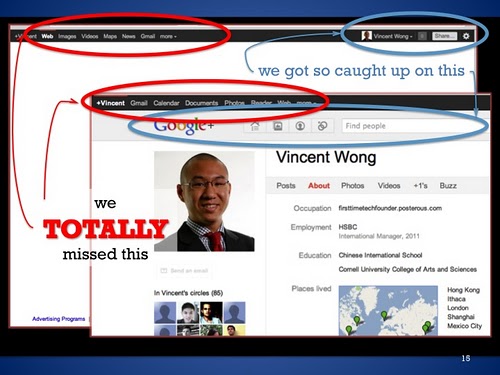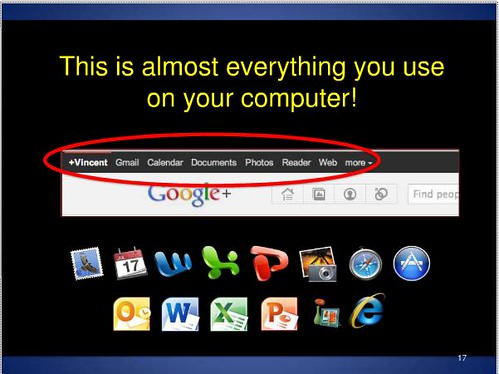In the midst of all the chatter about Google+, many people seem to have ignored what this is really about: monetizing the cloud. What Google wants to do is make easy for you to store all of your documents and files on their servers, for which they will charge a small fee and/or use your registration and user habits for marketing purposes. Vincent Wong explains:
That toolbar is pretty important:
Apple is also trying to capitalize on the cloud.
The recent 'upgrade' of iTunes which can put all of your iTunes purchases on the cloud is the most obvious effort. But the iPad with its relatively limited storage capacity is clearly an attempt to monetize the cloud (with drug dealers, the pipe and first hit is always free. Or at least cheap). 32 Gb isn't really much storage, but that doesn't matter if you're linking to the cloud. Of course, I'm not sure what you're supposed to do with all of your porn.
Both Google's and Apple's attempts are especially insidious, since they are targeted towards people who really aren't high-end computer users. I write insidious because I think storing many things on the cloud is stupid. Not only will you end up paying for access your own files (some of which you already paid for, others that you created), but you have ceded your privacy, your stuff to a corporation. Can't imagine what could possibly to go wrong with that. It will also make government vitiation of civil liberties that much easier.
But circles are groovy. Or something.
- Log in to post comments




"many people seem to have ignored what this is really about: monetizing the cloud."
Really? You mean it's not blindingly obvious to everyone? I mean, what is Facebook, really? A machine to collect data for marketing purposes. We knew that already. Why would anyone expect Google to be different? Or Apple?
Does anyone (who didn't already have a collection) still own porn anymore? Or has this already been outsourced to the cloud due to sheer ease of availability? It wouldn't surprise me if porn is a technology driver here as it historically has been in media.
I don't think people who use this technology are stupid, but I personally don't want anything to do with it. It takes a cost which I have full control of (storage) and places it in a paradigm of which I do not (they can get you signed up and then raise prices). Moreover you can buy literally a pair of 1 TB drives (2 for redundancy - frankly I have more and even store "off site") for $100.
The other problem is, given the less-than-secure work environments most of us suffer from these days, I don't want a service that if I am unable to pay I potentially lose data, documents, pictures, etc. I can't afford to.
That said, for corporations, provided the contracts are strong enough, this can actually be a good paradigm (Google Docs), however us little guys don't get to mark up our contracts...
The thing that gets me is that 'This is almost everything you use your computer for'. *You* maybe. Most people maybe. But not me. And it seems like every technological move recently makes things easier for that majority (which is good), but makes them hard-to-impossible for the minority of users who require actual functionality. And where it remains *possible*, you still end up having to pay a premium for it. I forsee a future where for the price of a current computer, you get the functionality of a tablet, all very streamlined and nice, but if you're a user who has actual work to do *with* the computer (rather than the 90% whose actual work is not with the computer per se, but uses the computer in a secondary role, like recording and manipulating the data associated with the work they do), you'll have to fight through interfaces *specifically designed* to hide the real functionality, and have to pay a severe mark-up to have features "unlocked"
And with all the flavors of GNU/Linux available that are becoming simpler and more friendly to use, there are readily available ways to avoid all of that. When I buy a new computer, the first thing that I do is install Linux over it, completely wiping Windows.
And, I don't expect to buy a Chrome pc in the future, either.
iCloud doesn't stream music or any other data to your device. Whenever you change a document, or buy a song, or whatever, it uploads the data to Apple's server, then downloads it to all of your other devices. So if the iCloud servers go down, or Apple shuts it down, your data doesn't disappear from your device.
So this means that you can't use iCloud to listen to music from a large library on a device with a small amount of storage. It downloads each song once, not every time you listen to it.
I have no idea what kind of security iCloud has. I can't find any public documentation on that.
what is Facebook, really? A machine to collect data for marketing purposes. We knew that already. Why would anyone expect Google to be different? Or Apple
use tor, i2p, or similar for some sites.
nyetnet for the rest. ime, 95+% of facebook pages that i bother checking are wob, so something like *.fbcdn.net/ and *.facebook.[^/]+/ belong in your killfile (hosts, adblock).
after researching and watching prices, i bought 2tb hitachi xl2000 external hdd recently, $80.
if you need touch and portability, then i guess ipad is cheaper than touch laptop. a real pc costs a little less (more if you need a display).